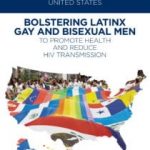 Yesterday, the O’Neill Institute released a new policy brief, Bolstering Latinx Gay and Bisexual Men to Promote Health and Reduce HIV Transmission. This brief, developed in partnership with Bienestar Human Services, a community-based social services organization in Los Angeles focused on health issues faced by the Latino and LGBTQ communities, examines the place of Latinx gay and bisexual men in the HIV epidemic in the United States and explores emerging trends in HIV diagnoses and engagement in care. In 2017, 1 in 5 new HIV diagnoses in the United States were among Latinx gay and bisexual men. HIV diagnoses among these men increased by 12% from 2012-2016, even as diagnoses decreased or remained stable in other groups.
Yesterday, the O’Neill Institute released a new policy brief, Bolstering Latinx Gay and Bisexual Men to Promote Health and Reduce HIV Transmission. This brief, developed in partnership with Bienestar Human Services, a community-based social services organization in Los Angeles focused on health issues faced by the Latino and LGBTQ communities, examines the place of Latinx gay and bisexual men in the HIV epidemic in the United States and explores emerging trends in HIV diagnoses and engagement in care. In 2017, 1 in 5 new HIV diagnoses in the United States were among Latinx gay and bisexual men. HIV diagnoses among these men increased by 12% from 2012-2016, even as diagnoses decreased or remained stable in other groups.
Geographically, rising diagnoses of HIV among Latinx gay and bisexual men are not a national phenomenon, but rather one driven by increases in seven jurisdictions. From 2010-2014, 84% of the increase in diagnoses observed among Latinx gay and bisexual men nationally was attributed to diagnoses in Puerto Rico and six states (Arizona, California, Florida, Illinois, New York, and Texas). This highlights the need both to address the HIV prevention and care needs of Latinx gay and bisexual men in all parts of the country, and to focus resources and a tailored intensive response where most diagnoses are occurring.
The O’Neill Institute got involved on this issue because urgent action is needed to support Latinx gay and bisexual men. Just as previous advocacy efforts and epidemiological data have led to greater efforts to focus on Black communities, Black gay and bisexual men, and Black women, recent trends demonstrate the need for particular focus on Latinx gay and bisexual men. Ending the HIV epidemic in the United States will only be realized if we do more to prioritize Latinx gay and bisexual men in everything we do and tailor services to meet their needs.
The brief highlights strategic actions that policy makers and others can take to ensure that Latinx gay and bisexual men are benefitting from the advances in HIV prevention and care. It identifies four policy actions that can have a significant impact:
- Strengthen governmental responses to HIV that focus on the prevention and care needs of Latinx gay and bisexual men;
- Address the social determinants of Latinx gay and bisexual men’s health
- Support immigrants and migrants, including when providing HIV services; and
- Cultivate and support emerging Latinx leaders.
We need to bolster Latinx communities and give Latinx gay and bisexual men the prominence and attention they deserve. Important work is already underway. Community partners and agencies from around the country have collaborated on a call to action articulating demands from Latinx gay and bisexual men for better support. In furtherance of this work, the O’Neill Institute is partnering with a group of Latinx gay and bisexual men to hold a pre-conference session at the 2019 National HIV Prevention Conference in Atlanta. The session, “Supporting Effective HIV Prevention and Care for Latinx Gay and Bisexual Men,” will be held on Monday, March 18th, from 1:30-3:30pm at the Hyatt Regency Atlanta Hotel. This will be a roundtable discussion, in which all session participants will share their ideas and commitments for supporting HIV prevention and care for Latinx gay and bisexual men. To participate in this session, please email me at seb86@law.georgetown.edu by Sunday, March 17th.
HIV diagnoses among Latinx gay and bisexual men are increasing, but we have the tools and capacity to counter this trend. It takes all of us to get involved.



